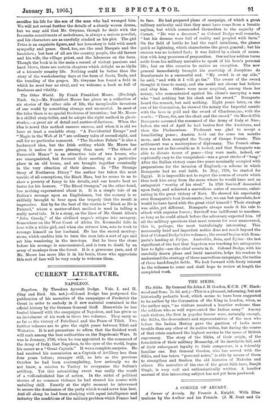NAPOLEON.
Napoleon. By Theodore Ayranit Dodge. Vols. I. and II. (Gay and Bird. 32s. net.)—Colonel Dodge has postponed the publication of his narrative of the campaigns of Frederick the Great in order to embody in it new material contained in the official history by the German General Staff. Meanwhile he has busied himself with the campaigns of Napoleon, and has given us an instalment of his work in these two volumes. They carry us as far as the victory of Friedland and the Peace of Tilsit. Two further volumes are to give the eight years between Tilsit and Waterloo. It is not premature to affirm that the finished work will rank among the best authorities on the Napoleonic Wars. It was in January, 1796, when he was appointed to the command of the Army of Italy, that Napoleon, to the eyes of the world, began his career as a "Great Captain." It was a complete surprise. He had received his commission as a Captain of Artillery less than four years before ; stranger still, as late as the previous October he had been contemplating, how seriously we do not know, a mission to Turkey to reorganise the Sultan's artillery. Yet this astonishing event was really the result of a well-calculated line of action. In the midst of political storms of no common violence he had steered his course with unfailing skill. Exactly at the right moment he intervened to secure the dominance of the party which would serve him best. And all along he had been studying with equal intelligence and industry the conditions of the military problem which France had to face. He had prepared plans of campaign, of which a great military authority said that they must have come from a lunatic asylum, but which commended themselves to the sagacity of Carnet. "He was a dreamer," as Colonel Dodge well remarks, "but his dreams were full of reality and peopled with facts." On the field of battle he had the rapid intuitions, the glance quick as lightning, which characterise the groat general ; but his success was no isolated fact; it was linked by a chain of causa- tion with long processes of preparation. Our author seldom turns aside from his military narrative to speak of his hero's personal life; but on this occasion he makes an exception. The new general immediately brought his courtship of Josephine de Beauharnais to a successful end. " My sword is at my side," he said, "and with it I will go far." The owner of the sword thought it time to marry, and she could not choose but believe and obey him. Others were more sceptical, among them her notary, who remonstrated against his client's marrying a man who " had nothing but his cloak and his sword." Bonaparte heard the remark, but said nothing. Eight years later, on the eve of his Coronation, he showed the notary the Imperial mantle with the bees in gold and the sword of Charlemagne, with the words : " There, Sir, are the cloak and the sword." On March 27th Bonaparte assumed the command of the Army of Italy at Nice; before the end of April he had beaten first the Austrians, and then the Piedmontese. Piedmont was glad to accept a humiliating peace ; Austria held out for some ten months more, and then accepted the Treaty of Campo Formic. This settlement was a masterpiece of diplomacy. The French situa- tion was not as favourable as it looked, and that Bonaparte was able to dictate terms of peace—they were made, indeed, ex- ceptionally easy to the vanquished—was a great stroke of "brag.. After the Italian victory came two years nominally occupied with preparations for the invasion of England,—a scheme in which Bonaparte had no real faith. In May, 1798, ho started for Egypt. It is impossible not to regret the course of events which thus took him away from the scene where he would have met an antagonist " worthy of his steel." In 1799 Suvdroff descended upon Italy, and achieved a marvellous series of successes, culmi- nating in tho great victory of Novi. He showed his superiority over Bonaparte's best lieutenants ; but, we can but speculate, how would he have fared with the great chief himself ? Their strategy was alike, yet different. Bonaparte always made it his rule to attack with superior forces ; Suveroff was indifferent to numbers, as long as he could attack before the adversary expected him. Of all the military questions that must remain for ever unanswered, this is, perhaps, the most tantalisingly interesting. This necessarily brief and imperfect notice does not reach beyond the first of Colonel Dodge's two volumes ; the second begins with Bona- parte's landing at Frejus. Austerlitz, Jena, and Eylau—the last significant of the fact that Napoleon was teaching his antagonists how to fight—are the chief events in it. Colonel Dodge, with his carefully drawn plans and lucid narrative, helps his readers to understand the strategy of these marvellous campaigns, the tactics of these hard-fought fields. We look forward with lively interest to the volumes to come and shall hope to review at length the completed work.
THE SIKHS.






































 Previous page
Previous page